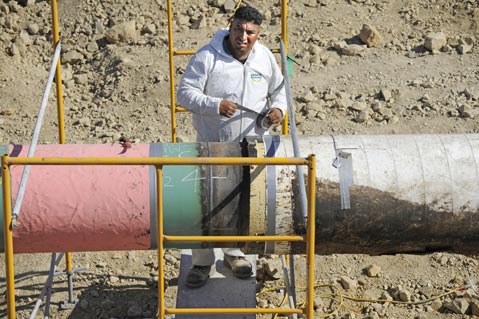Early Pipeline Finding Names Corrosion Likely Culprit

A six-inch hole and extensive external corrosion were found on the pipe that spilled 101,000 gallons of crude onto the Gaviota Coast on May 19. The Pipeline and Hazardous Materials Safety Administration (PHMSA) announced these findings on June 3 in an amendment to the Corrective Action Order it had issued on May 22 to shut down Plains All American’s pipeline at Refugio.
PHMSA’s amendment also notes the metal loss seen onsite was inconsistent with results from in-line inspections conducted as recently as May 5. Determining the cause of the rupture awaits further tests, and PHMSA identifies a second pipeline that needs testing.
Where Line 901 broke, before the broken pipe was shipped out for examination on May 29, third-party metallurgists measured the wall thickness to be about 1/16 of an inch, which is thinner than the 45 percent metal loss reported in Plains’ May 5 in-line inspection survey. At its worst, that survey found thinning of between 54-75 percent of the original pipe wall thickness. The corrosion was mainly on the bottom quadrant of the pipe, and not confined to the girth welds.
Cathodic protection, which is used to control corrosion, on the pipe was adequate, PHMSA said, and the corrosion that existed “would not be expected.” PMHSA on-site inspectors noted three repairs due to external corrosion had been made near the failure site after a 2012 in-line survey.
Today’s amendment also requires that Line 903, a 30-inch pipeline connected to Line 901 and of similar composition, be tested. That pipeline moves crude along 128 miles between the Gaviota and Emidio stations, and the inspection results for 2013 and 2014 are inconsistent, the amendment states. One section had 99 metal loss anomalies to be investigated, while a section twice as long showed corrosion but nothing to investigate.
Along with Line 901, Line 903 was shut down on May 19, but 903 restarted on the 29th and has been shut down since May 30.
Santa Barbara’s congressional representative, Lois Capps, issued this statement this morning:
“I am incredibly troubled by the degree of systemic corrosion that has already been found on the Plains All American pipeline. Plains must keep the entire pipeline shut down – it is simply too dangerous and the risks are too great to have this pipeline in operation at this time. The Pipeline Hazardous Materials Safety Administration must prohibit the restart of any portion of Lines 901 or 903 until the full investigation is complete, the corrosion issue is fully understood, all issues are addressed, and Plains can prove that its pipeline is safe.”
This story was updated on June 3 and 4.



